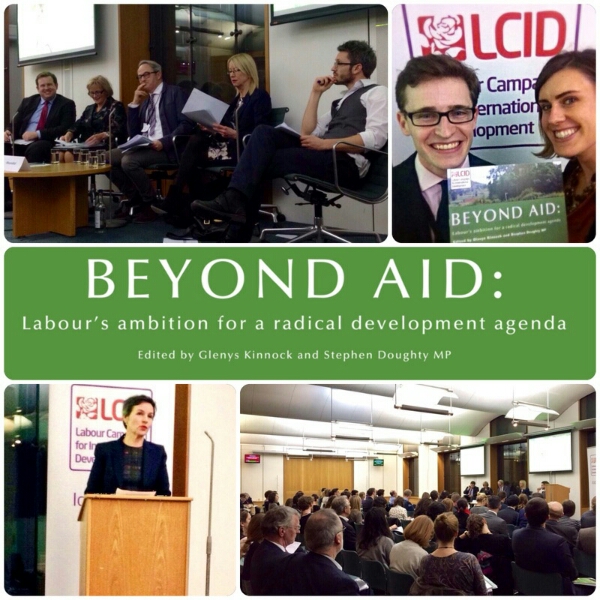Last night LCID hosted the launch of Beyond Aid, a new pamphlet edited by Glenys Kinnock and Stephen Doughty MP. With contributions from a range of experts, the pamphlet has some great insights on what Britain can to do continue its global leadership in international development.
Shadow Secretary of State Mary Creagh kicked off the event, setting out her commitment to international development under a Labour government, and emphasising in particular the importance of tacking climate change, universal healthcare and human rights.
Glenys Kinnock spoke first on the panel, reminding the audience of the importance of treating development as a political issue, as justice not charity, and as something we must keep fighting for. As the various contributions to the pamphlet make clear, she said it is Labour’s values that underpin the party’s approach to development, including solidarity and mutual care across borders.
Stephen Doughty spoke about what this values-driven approach means for government: how do we move beyond DFID to build policy coherence across departments, and how do we ensure that there is positive benefit for international development of all government policies, domestic and international? In a fascinating Q&A he took this theme further, looking at British companies, British NGOs, British civil society, and how we all share a responsibility for determining Britain’s role in the world. How do our companies behave? What impressions does this behaviour send to the world?
Mary Riddell strongly endorsed the new pamphlet. She emphasised how important it is for Labour, and the left, to keep making the case for international development at a time when politics has become quite introverted and parochial. Moving beyond the contributions in the pamphlet, she suggested tackling corruption and responding to humanitarian crises as development issues on which the British public can and will engage – if only the left can make the case forcefully enough.
Jason Hickel provided a brilliant challenge to the panellists, and the pamphlet, and reminded us just how far we have to go to really make a difference to global poverty. Countries still pay far more servicing debts than they receive in aid. Trade policies are too often skewed against the poor. Wages globally remain hugely unequal between developed and developing countries.
While domestic issues dominate the election, the pamphlet and last night’s event are fantastic reminders of the scale of the international challenge that awaits the next government.
It is the most important year for international development in a decade, with major summits on the Sustainable Development Goals and how we finance them, and a long-awaited opportunity to reach a global agreement on climate change.
Labour achieved a huge amount when last in government: we created a world-leading development department, secured debt cancellation and prioritised human rights and climate change alongside economic growth. Even during the global financial crisis, we stood by our commitments and delivered progress for the world’s poor.
But in the last five years, global cooperation has stalled in some cases and been thrown into reverse in others. The poorest people in the world are paying the price and so is Britain. The UK is dampening its ambitions in the world at precisely the time when a huge leap forward is required.
If Labour gets back into power, we want Britain to be a progressive powerhouse again.
We as LCID have set out our asks of the next Labour government, which we have fed into the manifesto process. You can read them here.
Over the last few weeks we are pleased to have seen the Labour leadership paying more and more attention to these crucial issues, committing to reducing poverty and inequality, and tackling climate change. As Ed Miliband said, “More than ever Britain and the world need leadership on tackling poverty, inequality and climate change. This is about ensuring the next generation can do better than the last in this country and around the world.”
Last night’s event showed the strength of support for international development within and beyond the Labour movement. Just as importantly it demonstrated the energy to keep challenging how we approach international development, how we fight better and harder for justice and equality.
We’d like to say thank you to all those who contributed to the pamphlet, to Jessica Toale and Elliott Perkins for their work to support it, to all the panellists, to Ben Jackson for chairing the event, and to everyone who attended and joined us for the debate on Twitter at #BeyondAid

